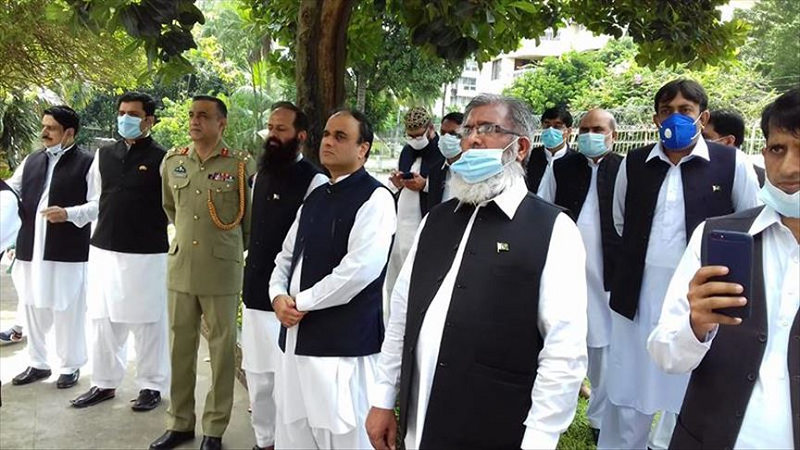
In a rare move, Pakistan’s top diplomat in Bangladesh on Friday praised the contributions of the Muslims of Bengal in the creation of Pakistan.
“Their efforts are very well documented both in Pakistan and Bangladesh. Today, we remembered all our leaders and prayed for their souls,” Imran Ahmed Siddiqui, Pakistan’s High Commissioner in Dhaka, told Anadolu Agency while speaking on the occasion of the 73rd Independence Day of the country.
Pakistan’s High Commission in Dhaka on Friday also celebrated the day through recitation from the Quran and raising the country’s national flag to the tune of the national anthem.
Due to the prevailing coronavirus pandemic in Bangladesh, the program, however, was held with limited participation.
Pakistan got independence from the British on Aug. 14, 1947. Until 1971, Bangladesh was a part of Pakistan.
Recalling the struggles of the Muslims in the then Bengal province, Siddiqui added: “The leaders of Bengal – Nawab Sir Saleemullah, Hussain Shaheed Suhrawardy, A K Fazlul Haq, Moulvi Tamizuddin, among several others, are part of glorious history of our struggle for Pakistan.”
Referring to relations between Pakistan and Bangladesh, he added that both countries “share unbreakable bonds of history, religion and culture. I am sure these bonds will become even stronger in the days ahead.”
Frosty relations between Pakistan and Bangladesh have only recently begun thawing, with observers saying China has a role in mediation.
Last month, Pakistan's Prime Minister Imran Khan spoke to his Bangladeshi counterpart Sheikh Hasina over the phone.
Quiet diplomacy
The Express Tribune had recently reported on quiet diplomatic efforts being initiated by the two countries, citing diplomatic sources who revealed that the current regional security environment compelled the two to reset their troubled ties.
Earlier this month, Pakistan's High Commissioner Imran Ahmed Siddiqui held a rare meeting with Bangladesh Foreign Minister AK Abdul Momen in Dhaka. The meeting raised eyebrows in New Delhi, which viewed the development with suspicion.
The Bangladesh government called the meeting a "courtesy call" but sources said it was much more than that. It is believed that Imran-Hasina telephonic conversation on Wednesday (today) was the result of that meeting.
Relations between the two countries have remained tense for the last many years. The two countries have yet to overcome the bitter memories of 1971 that led to the creation of Bangladesh.
What led to the current low in their ties was the decision taken a few years ago by the incumbent government of Shaikh Hasina Wajid to try and execute several leaders of Bangladesh Jamaat-e-Islami on charges of committing war crimes in 1971.
Pakistan was against such, what it called, politically motivated trials. It also accused Dhaka of violating the 1974 trilateral agreement between Pakistan, India and Bangladesh. Under the agreement, all countries including Bangladesh had agreed not to pursue cases against people involved in the 1971 events.
Relationship between the two countries worsened to the extent that Pakistan's National Assembly in 2016 passed a unanimous resolution condemning the execution of JI leaders.
Not just that the Bangladesh government refused to approve the appointment of Pakistani High Commissioner for 20 months. Islamabad eventually had to make the fresh proposal for the appointment of Imran Ahmed Siddiqui as envoy to Dhaka. His name was finally approved by Dhaka in November last year. Siddiqui joined the Pakistani mission in Dhaka in January, raising hopes of a thaw in their ties.
Foreign office sources were cautious about calling the meeting held earlier this month as a "breakthrough" or whether this would lead to breaking the ice.
One of the reasons that foreign office sources were playing down the outreach was to avoid creating unnecessary hype and allowing "spoilers" to undermine such efforts.
Indian media reports expressed alarm over the meeting between Pakistani envoy and Bangladeshi foreign minister, claiming Islamabad was trying to take advantage of India's preoccupation with other issues.
New Delhi and Dhaka have longstanding ties and those relations further deepened when Indian Prime Minister Narendra Modi came to power in May 2014. India has exercised great influence over Bangladesh and took full advantage of PM Shaikh Hasina Wajid's mistrust with Pakistan. But India and Bangladesh ties suffered a major blow when Modi government last year passed a controversial Citizenship Amendment Act (CAA). The law had triggered massive protests in Bangladesh and in March, Modi had to cancel his visit because of growing anti-India sentiments.
In the middle of this, China also made inroads in Bangladesh by offering economic and other partnership. Dhaka is already part of Belt and Road Initiative (BRI).
Recently, Beijing allowed Bangladesh to export goods to China with zero tariffs. Similarly, China has been assisting Bangladesh in dealing with Covid-19 pandemic.
As a result of this cooperation, Bangladesh surprisingly kept quiet over the recent military standoff between India and China.
Dhaka even did not offer condolences to India over the killing of its 20 soldiers, including a colonel, during a bloody fight with China in the high altitude Ladakh region.
Observers believe that the changing dynamics offered a good opportunity for Pakistan and Bangladesh to revisit their troubled ties.
With input from News Desk














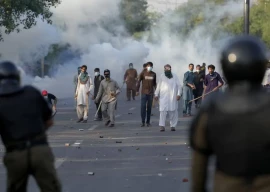
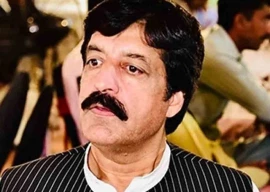
1712071304-0/image-(14)1712071304-0-270x192.webp)












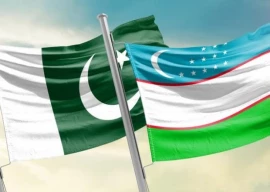
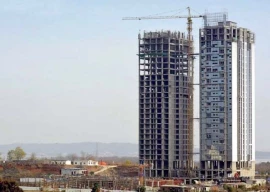
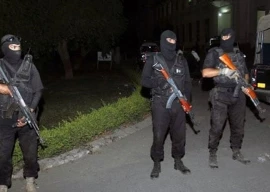

1714819959-0/Untitled-design-(21)1714819959-0-270x192.webp)
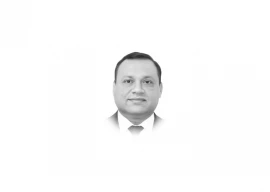





COMMENTS
Comments are moderated and generally will be posted if they are on-topic and not abusive.
For more information, please see our Comments FAQ